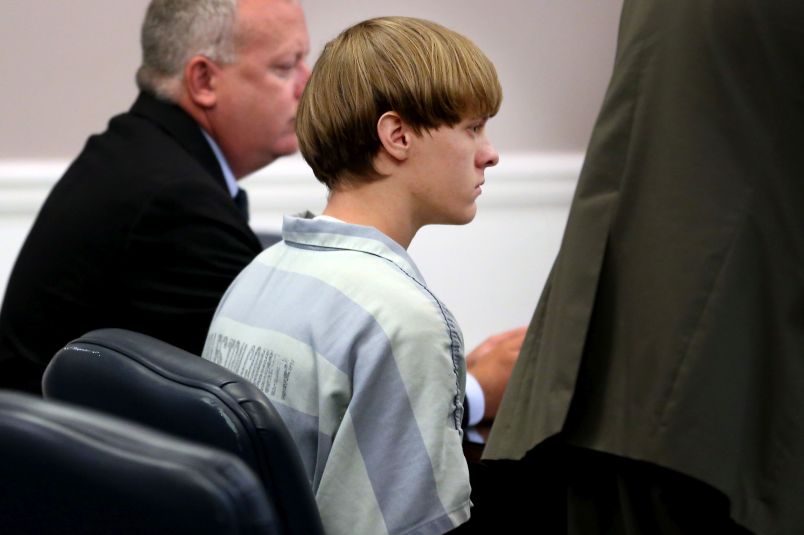CHARLESTON, S.C. (AP) — Dylann Roof has again been found competent to stand trial in last year’s massacre at a historic black church in South Carolina that left nine parishioners slain at a Bible study. After a second hearing over his mental capacity, a judge has ruled that Roof cannot only now be sentenced for his crimes but can represent himself in those proceedings.
The same jury that last month took less than two hours to find Roof guilty of all 33 counts, including hate crimes and obstruction of religion, returns to court Wednesday to begin mulling if he should be sentenced to life in prison or receive the death penalty.
Here’s what has happened and what to expect.
___
LIFE OR DEATH
Prosecutors have said they might call as many as three dozen witnesses to make their case for why Roof, 22, should get the death penalty for the June 2015 slaughter at Emanuel African Methodist Episcopal Church in Charleston.
The defense put up no witnesses during the seven-day trial. They repeatedly tried to work in evidence about Roof’s mental state, but U.S. District Judge Richard Gergel ruled that had nothing to do with Roof’s guilt or innocence.
Roof has been adamant on representing himself during the sentencing phase of trial, with his defense team staying on as legal advisers. The capital defense experts who represented Roof during the guilt phase have said they fear he won’t put up evidence that could potentially spare his life out of fear of embarrassing himself or his family.
___
ROOF’S COMPETENCY
Roof’s whole trial was put on hold for several weeks so that Gergel could hold a first competency hearing. During that proceeding, which was closed to the public over media objections, Gergel heard two days of testimony, after which he determined Roof was mentally competent to face trial.
After he was found guilty, a day before the scheduled start of the sentencing phase, Gergel held another hearing on Roof’s mental status, saying serious enough issues had been raised in filings made under seal that he needed to address them in court.
For his part, Roof wrote in a journal read in court during his trial that he doesn’t believe in psychology, which he called “a Jewish invention” that “does nothing but invent diseases and tell people they have problems when they don’t.”
In deeming him competent both to stand trial for sentencing and to represent himself, Gergel gave Roof an extra day to prepare his case. Jurors now will return to court Wednesday.
___
RACIAL HATRED
Prosecutors say Roof wanted to start a race war. His two-hour confession to the FBI seemed key to jurors’ deliberation. One hour in, they asked to rehear the videotaped confession.
Roof also documented his hate in his journal, found in his car when he was arrested.
Roof believed segregation needed to return to keep white people from falling to the level of blacks. It had other bogus claims that whites were naturally the superior race and that blacks liked slavery.
Testimony in the case opened and closed with two of the massacre’s survivors.
Polly Sheppard said Roof told her he wanted to leave her alive to tell the world why he attacked a historic African-American church.
“I have to. I have to,” Sheppard recalled Roof telling her. “You’re raping our women and taking over the nation.”
Her 911 call was the final evidence jurors heard.
___
VICTIMS’ PERSPECTIVES
Some relatives of the nine shooting victims attracted copious amounts of attention for showing Roof mercy during his initial court appearance after his arrest, saying they’d pray for him. In the run-up to the federal death penalty trial, other victims’ family members have said they favored the death penalty for Roof, sentiments echoed by some in media interviews after the guilty verdict.
Others, including shooting survivor Felicia Sanders, have been more coy, saying their preferences would become known during the sentencing proceedings. Many family members are expected to testify and give what are known as victim impact statements to the court, and, if he wants to do so, Roof himself would be asking them questions on cross-examination.
___
ANOTHER TRIAL NEXT YEAR
Roof faces a second death-penalty trial early this year in state court, where he’s charged with nine counts of murder. A state judge is ordering 600 prospective jurors to report to the Charleston County Courthouse on Jan. 17 for initial screening. His order says the trial will begin on or after Jan. 30. It’s not clear when the federal case will wrap up. For now, Roof has attorneys representing him in the state case.
___
Kinnard can be reached at http://twitter.com/MegKinnardAP . Read more of her work at http://bigstory.ap.org/content/meg-kinnard/ .
Copyright 2017 The Associated Press. All rights reserved. This material may not be published, broadcast, rewritten or redistributed.






